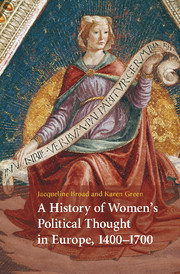Book contents
- Frontmatter
- Contents
- Preface
- Introduction
- 1 Christine de Pizan
- 2 Women of the Italian Renaissance
- 3 From Anne de Beaujeu to Marguerite de Navarre
- 4 Queen Elizabeth I of England
- 5 From the Reformation to Marie le Jars de Gournay
- 6 Women of the English civil war era
- 7 Quaker women
- 8 The Fronde and Madeleine de Scudéry
- 9 Margaret Cavendish, Duchess of Newcastle
- 10 Women of the Glorious Revolution
- 11 Women of late seventeenth-century France
- 12 Mary Astell
- Conclusion
- Bibliography
- Index
5 - From the Reformation to Marie le Jars de Gournay
Published online by Cambridge University Press: 02 July 2009
- Frontmatter
- Contents
- Preface
- Introduction
- 1 Christine de Pizan
- 2 Women of the Italian Renaissance
- 3 From Anne de Beaujeu to Marguerite de Navarre
- 4 Queen Elizabeth I of England
- 5 From the Reformation to Marie le Jars de Gournay
- 6 Women of the English civil war era
- 7 Quaker women
- 8 The Fronde and Madeleine de Scudéry
- 9 Margaret Cavendish, Duchess of Newcastle
- 10 Women of the Glorious Revolution
- 11 Women of late seventeenth-century France
- 12 Mary Astell
- Conclusion
- Bibliography
- Index
Summary
By the middle of the sixteenth century, two of the features of Christine de Pizan's political thought, which had been innovative and distinctive when she wrote, had become staples of Protestantism. The first of these was the defence of marriage, which in Christine's writing was intimately connected with the defence of women. The second was the idea that temporal authority comes directly from God and is not mediated by the Pope; elements of which doctrine, we argued, Christine had absorbed from Dante. This latter doctrine was subsequently reflected in the view, characteristic of Elizabeth I and her heir James I, that monarchs are accountable to God alone, deriving their authority, and the duty to care for their subjects, directly from this source. It was expressed also by Marguerite de Navarre's daughter, Jeanne d'Albret (1528–72), who introduced the reformed religion into Navarre, and who, like Elizabeth, was consequently threatened with invasion by Philip II of Spain.
During the next hundred years, a new focus emerged in women's political writing. Rather than defending marriage against the attacks of clerical misogynists, the most outspoken and radical female writers increasingly attack marriage as an institution that makes women slaves who are tyrannised over by men. This pre-Enlightenment critique of women's subjection in marriage arose first in the writings of Venetian women, and was taken up later in France. We examine it in the second part of this chapter.
- Type
- Chapter
- Information
- A History of Women's Political Thought in Europe, 1400–1700 , pp. 110 - 139Publisher: Cambridge University PressPrint publication year: 2009

